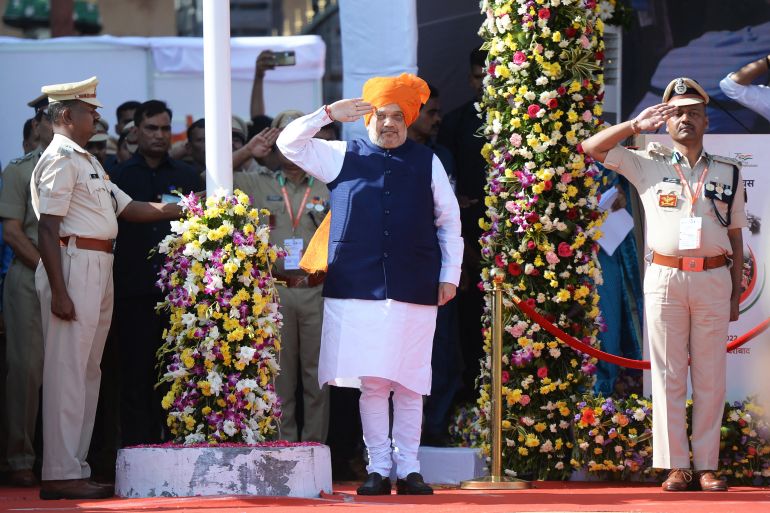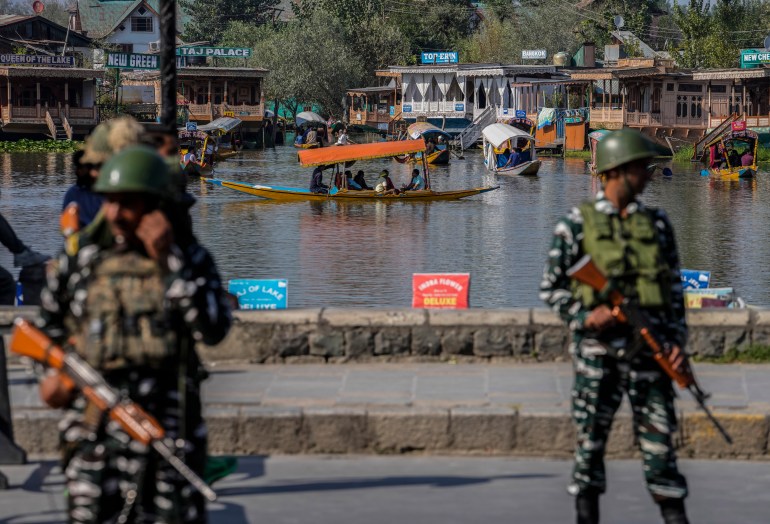In Kashmir, India’s home minister says no to talks with Pakistan
India’s Home Minister ruled out talks with Pakistan and says he is ready for dialogue with Kashmiris during his trip to the region.

Srinagar, Indian-administered Kashmir – India’s Home Minister Amit Shah has rejected the possibility of dialogue with arch foe Pakistan over Kashmir during his second visit to the Indian-administered part of the disputed region since its autonomy was scrapped three years ago.
“Some people tell us to talk to Pakistan,” he said while addressing supporters at a rally in the Baramulla district on Wednesday. “Why should we talk to Pakistan? We will not talk.”
Keep reading
list of 4 itemsTruckloads of apples are rotting as Kashmir highway is blocked
Kashmir gets its first multiplex as cinemas return after 23 years
Photos: Fisherwomen around Kashmir lake fear losing livelihood
Shah said he wanted to speak to Kashmiris instead.
India has refused to hold talks with Pakistan, whom it accuses of supporting groups fighting to take the Muslim-majority Himalayan region out of India. Both India and Pakistan claim all of Kashmir but govern only parts of it.
In 2019, Indian Prime Minister Narendra Modi removed an article in the Indian constitution that gave limited autonomy to Kashmir and divided the region into two centrally administered territories – Kashmir and Ladakh.
Shah, a close aide of Modi, hailed the decision and said the constitutional provision was a “hindrance in the development of the region”.
“You people come to mainstream and choose development to go forward,” said Shah, who arrived on a three-day visit to Kashmir on Monday. “We want Kashmir to become a paradise of India.”
The home minister reiterated his government’s aim to “wipe out terrorism from Kashmir”. The government had invoked terrorism to scrap the region’s special status.

The senior leader of the ruling Bharatiya Janata Party (BJP) promised job quotas for the Pahari people, which would be the first quotas awarded on the basis of language. The Pahari are a tribal community of both Muslims and Hindus who speak the Pahari language, which is distinct from Kashmiri.
Political observers see his quota decision as part of a campaign by Modi’s BJP to woo Pahari voters.
“Before the abrogation of Article 370, the Gujjar and Bakerwal [tribal communities] and Pahari did not get benefits,” Shah said in Rajouri in the Jammu region. “Modi removed Article 370. Now you will get a reservation [quota].”
Zafar Choudhary, a political expert based in the southern city of Jammu, told Al Jazeera that after the 2019 constitutional changes, New Delhi cannot afford a hostile government in Kashmir. Therefore, he said, the BJP, pulling out all the stops to widen its voter base ahead of state elections that will take place once the electoral rolls are confirmed.
If [an election is imminent], Jammu and Kashmir is then already in poll mode and Shah’s visit is the first campaign takeoff,” Choudhary said.
Former Kashmir Chief Minister Mehbooba Mufti said the interior minister’s visit was meant to camouflage what is really going on in the region.
“While HM [home minister] is going around Kashmir beating drums of normalcy, I am under house arrest for simply wanting to visit Pattan (district Baramulla) for a worker’s wedding,” Mufti said in a tweet. “If an ex CM’s [chief minister’s] fundamental rights can be suspended so easily, one can’t even imagine the plight of a commoner.”
Heightened security measures were taken across the region during Shah’s visit, and residents in many places complained of frisking and random checks on roads and accused security forces of harassment.
On Wednesday morning, a 23-year-old civilian named Asif Ahmad was killed in southern Kashmir’s Pulwama district. Police blamed “misfire”.
Shah has been instrumental in stripping Kashmir of its autonomy. Kashmiris have lost their exclusive rights over jobs and scholarships and people from other parts of India were given rights to buy property and settle in the region.
The move sparked anger. Kashmiris fear this step by the Hindu nationalist government is designed to change the demography of the Muslim-majority region.
The government argued that scrapping the region’s special status would wipe out violence and bring development to Kashmir, but little has changed on the ground. Political instability and gunfights between rebels and Indian forces have continued.
New Delhi has been accused of using draconian laws to silence journalists and activists. The Indian armed forces have also stepped up their presence on Kashmir’s streets, and many new security checkpoints have been established.